
What is locum tenens?
In Latin, locum tenens means “to take the place of someone temporarily.” In healthcare, the term refers to physicians who work temporary assignments.
Through our trusted brands — CompHealth, Weatherby Healthcare, and Global Medical Staffing — we provide temporary and permanent placement of physicians, allied health professionals, and nurses to healthcare facilities across the country and abroad.
Why physicians work locum tenens
From great compensation and flexible schedules to a remedy for burnout and the chance to help underserved patients, locum tenens offers healthcare providers an array of benefits.
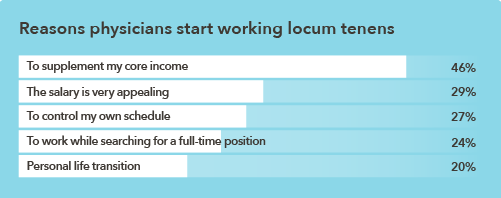
Our 2024 State of Locum Tenens Report revealed that for half of respondents (46%), physicians chose to work locum tenens primarily to supplement their core income, while 29% chose to work locums because the salary was appealing. Other reasons include more control over their schedule and to fill a career gap while searching for a job or transitioning to retirement.
How do physicians feel about locum tenens? The overwhelming majority (81%) have a positive impression of it, and 90% of physicians who’ve worked locums are, to some degree, likely to continue locums work.
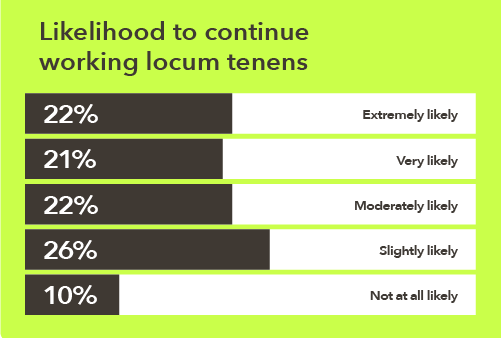
Taking back control: How locum tenens pay allows physicians to live their best lives (Weatherby Healthcare).
Here are a few doctors who share why they’re so happy they found locum tenens.
Dr. Tammy Allen
When Dr. Tammy Allen was finishing her medical school residency, she wasn’t sure what she wanted to do next. Her friends were all set with long-term jobs, but that didn’t feel right for her. Instead, she decided to give locum tenens a try.
“When I started out as a locum everyone asked why I was doing locums. I told them, ‘Because I really don’t know what I want to do,’” she recalls. “Now they ask why are you doing locums and I say, ‘Because I know exactly what I want to do.’”
Eleven years later, Dr. Allen is still working locum tenens full time and loves the flexibility it gives her to both practice medicine and still do the things she loves most — traveling and volunteering.
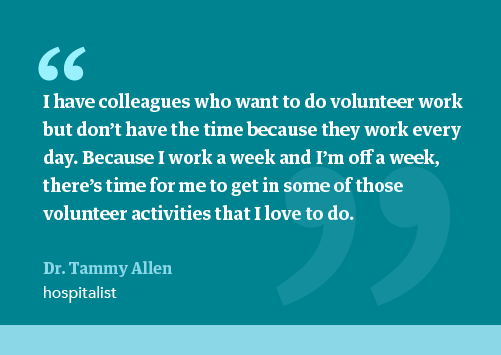
“I have colleagues who want to do volunteer work but they literally don’t have the time because they work every day. Because I work a week and I’m off a week, there’s time for me to get in some of those volunteer activities that I love to do,” Allen says.
Learn more about how working locum tenens allows Dr. Allen to give back to the community.
Dr. Larry Daugherty
Dr. Larry Daugherty wanted to be a physician because it gave him the opportunity to help people. Wanting a deeper connection to his patients, he decided to pursue a career in radiation oncology and opened a cancer center in Anchorage, Alaska.
“I really felt like the interactions and the connections that doctors have with their patients are much different in oncology than they are in other areas of medicine,” Daugherty says. “When I did a rotation in my third year, a patient came into a radiation oncology clinic for their five-year anniversary of being cancer-free, and the doctor had actually made the patient a cake and the whole office celebrated. There was just something about that experience that spoke to me and that showed me that doctors in oncology are very deeply connected with their patients in a personal way.”
Because he’s the only radiation oncologist in the area, he has to plan ahead when he takes time off. That means hiring locum tenens physicians to fill in while he’s gone.
“When I do something awesome outside of work, I feel like I come back to work an even better doctor, dad, and husband,” Daugherty says. “I was scared coming up to a practice all by myself without any partners, but it hasn’t been a problem at all. I do need to plan a little bit more ahead of time, but I’m able to take vacations confidently and comfortably knowing I’m leaving my practice in good hands when I do leave.”
Dr. Elizabeth Dayton
After working in private practice for over 20 years, Dr. Dayton decided to quit. “I was a little burned out with my schedule. I was working too many hours and was having difficulty knowing how it would be possible to change that in my current practice. I was worn out and ready for a change.”
She knew about locums, but trusting that locums would bring in enough income initially gave her pause. “But I feel like it’s been one of the best things I’ve done. Life is short, and getting different experiences is invaluable to me. I’m really glad I did it.”
Not shying away from a challenge, Dr. Dayton decided to go to New Zealand for her first locums assignment. She and her wife, Rachel, spent eight months there — and they both loved it. “I just fell in love with New Zealand and the people there, the practice, the lifestyle, and the schedule.”
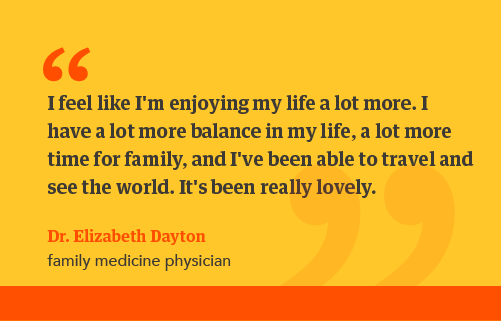
She intends to continue working locums until she fully retires. “I feel like I’m enjoying my life a lot more. I have a lot more balance in my life, a lot more time for family, and I’ve been able to travel and see the world. It’s been really lovely.”
Dr. John Gray
From a young age, Dr. John Gray knew he wanted a career where he could make a difference in people’s lives. Working in medicine gives him the opportunity to provide care to patients in underserved areas.
“The reason I choose to serve underserved areas is because that’s what I grew up with,” he shares.
After closing his private practice, he decided to try locum tenens to continue providing quality patient care. One of his assignments was for the state of Ohio as a prison physician.
“The response of the prisoners has been surprising to me,” he says. “They have been very courteous and grateful and have voiced numerous times that I genuinely care about them.”
Learn why Dr. Gray is so passionate about serving underserved areas.
Dr. Tina Passalaris
Dr. Tina Passalaris’ life as a full-time oncologist left her feeling like a visitor in her own home.
“I was absent from my kids’ lives. I didn’t go to school plays, and it was uncanny how often I would be on call during the most important nights,” she recalls. “I was late to absolutely everything, an unreliable member of the family. There’s only so much of that your family can take.”
To remedy the problem, she quit her full-time job and used locum tenens assignments to balance practicing medicine with being a full-time participant in her children’s lives.
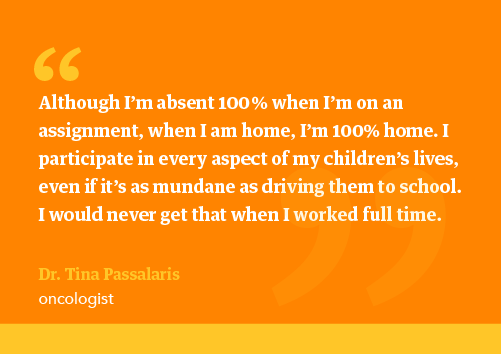
“Although I’m absent 100% when I’m on an assignment, when I am home, I’m 100% home,” Passalaris says. “I participate in every aspect of my children’s lives, even if it’s as mundane as driving them to school. I would never get that when I worked full time.”
Hear more about the ways locum tenens has given Dr. Passalaris more time with her family.
Dr. Sonya Sloan
“After fifteen years of schooling and training, it was time to have a family, and the option to go full time — to start a practice and be on call — wasn’t conducive to what I wanted or needed,” orthopedic surgeon Dr. Sonya Sloan says. “I needed a lifestyle. I needed options. And locum tenens was that option. I choose where I go, how long I’m there, what I’m willing to do, and what I’m not willing to do.”
Dr. Sloan values the diversity of experience locums provides and the opportunity to learn to function in all professional environments. Ultimately, the lifestyle is most rewarding to her and allows her to devote time to her family, and philanthropic pursuits.
“Locum tenens has allowed me to be more than just my profession,” says Dr. Sloan. “I’m an orthopedic surgeon by trade, but there’s more to life. So with that, I definitely have a 'pay it forward' mentality and a mindset of what legacy I’m going to leave.”
Hear why Dr. Sloan likes being a locum physician:
CHG Healthcare helps connect physicians with the communities that need their help the most. Click below to learn more about our role in healthcare.